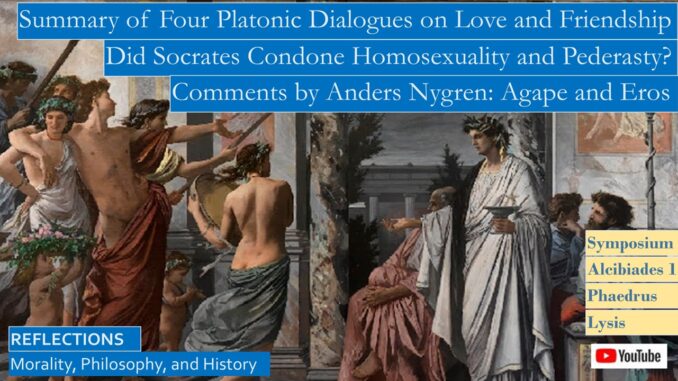
How can we benefit by reflecting on Four Platonic Dialogues on Love: Lysis, Alcibiades, Symposium, and Phaedrus? How similar are they?
Was it possible for men and women, and husbands and wives, to be friends in ancient Greece and Rome?
Did the Platonic dialogues on love condone or encourage homosexuality and pederasty, or men-boy love?
We will also ponder the comments on these dialogues by the theologian Anders Nygren in his influential book, Agape and Eros, and also by the psychologist Michel Foucault in his works on Sexuality.
YouTube video for this blog: https://youtu.be/cjXRXQc6Ff4
YouTube Script with more Book Links:
https://www.slideshare.net/BruceStrom1/platonic-dialogues-on-love-symposium-phaedrus-lysis-alcibiades-1-comments-by-anders-nygren
THE FOUR PLATONIC DIALOGUES ON LOVE
There are four Platonic dialogues on love, the Symposium, the Phaedrus, which we have already reflected on in our videos, and an early dialogue, Lysis, a shorter dialogue on love and friendship. In addition, Xenophon penned his own Socratic dialogue on the Symposium. We also include Alcibiades 1 in our Platonic dialogues on love, since Alcibiades 1 and Plato’s Symposium ponder the nature of the friendship between Socrates and his famous and problematic student, the outrageous Alcibiades.
Since I am a Christian, whether Plato and Socrates condone or merely tolerate homosexuality, and in particular pederasty, is an important question. There is no doubt that homosexuality and pederasty was more prevalent and accepted in the ancient world than in the modern world. But it is also true that both in the ancient and modern worlds that some people favored homosexuality and pederasty, and some who either opposed or were uncomfortable with these practices.
We first reflected on the Symposium dialogues by Plato and Xenophon. Xenophon tolerates pederasty and homosexuality, he does not promote it, but Plato’s dialogue has passages that condone and condemn these practices. In each Symposium, or dinner party, first the guests deliver a series of speeches, and in Plato’s Symposium, these speeches are on carnal romantic love.
Xenophon and Plato, Socratic Dialogue, Symposium, Romantic and Carnal Love, Part 1
https://seekingvirtueandwisdom.com/xenophon-and-plato-socratic-dialogue-symposium-romantic-and-carnal-love-part-1/
https://youtu.be/OIe5pn2S1Ls
Then Socrates, in each Symposium, delivers the capstone speech on Divine Love.
In Plato’s Symposium, the drunken Alcibiades crashes the dinner party after Socrates finishes his uplifting discourse on how Diotima taught him the virtues of Divine Love. Alcibiades remembers how he tried to seduce his friend Socrates, but he respected his preference for a friendship based on Divine Love.
Xenophon and Plato, Socratic Dialogue, Symposium, Divine and Noble Love, Part 2
https://seekingvirtueandwisdom.com/xenophon-and-plato-socratic-dialogue-symposium-divine-and-noble-love-part-2/
https://youtu.be/z6X3pwVTdrc
The friendship between Alcibiades and Socrates is explored further in Alcibiades 1. We agree with ancient and medieval scholars who accept that this is an authentic Platonic dialogue, though it may be penned by his student under his direction.
Platonic Dialogue Alcibiades 1, On Friendship, Leadership, and Love
https://seekingvirtueandwisdom.com/platonic-dialogue-alcibiades-1-on-friendship-leadership-and-love/
https://youtu.be/WbCARvApLNk
The next dialogue is between the young Phaedrus and Socrates, and they discuss whether Phaedrus should allow Lysias to seduce him into a homosexual relationship, and there is milt flirting between Socrates and his young student, again pursuing more a divine than an erotic love.
The first part of the dialogue discusses how many people misuse rhetoric, delivering speeches that manipulate and mislead rather than inform. Socrates critiques the seducing speech of Lysias, showing its faults, and unsuccessfully tries to improve the speech, but finds that it is impossible to purify a deceitful speech.
Plato’s Dialogue of Phaedrus on Carnal Love and Rhetoric, Part 1
https://seekingvirtueandwisdom.com/platos-dialogue-of-phaedrus-on-carnal-love-and-rhetoric-part-1/
https://youtu.be/JFw5ThfwUAg
Socrates scraps the speech, replacing it with a memorable speech on Divine Love with the delightful allegory of the heavenly chariot. This chariot driven only by mortals has both an immortal steed that seeks to ascend to the heavens, representing Divine Love, and a mortal steed that seeks to descend to the earth, representing carnal pleasures. Love and life is the struggle the charioteer mediates between these two horses.
Plato’s Dialogue of Phaedrus on Divine Love and the Heavenly Chariot, Part 2
https://seekingvirtueandwisdom.com/platos-dialogue-of-phaedrus-on-divine-love-and-the-heavenly-chariot-part-2/
https://youtu.be/BOtavup_N4g
But then we reflected on the dialogue where the young Lysis discusses the nature of friendship with Socrates. Hippothales, an older companion, asks Socrates to introduce him to Lysis, the handsome young man he has a crush on. These old men are watching these teenagers work out nude in the gymnasium in Athens. There is no hint of condemnation of pederasty in this dialogue.
Lysis, Platonic Dialogue on Love and Friendship, Where Old Men Ogle Boys at the Gymnasium
https://seekingvirtueandwisdom.com/lysis-platonic-dialogue-on-love-and-friendship-where-old-men-ogle-boys-at-the-gymnasium/
https://youtu.be/HrSZ5SPUZ7Y
HOMOSEXUALITY AND PEDERASTY IN ANCIENT GREECE
The practice of pederasty, or men-boy love, is so embedded in Greek culture that there is even a myth where Zeus, in the form of an eagle, abducts the mortal youth Ganymede. Ganymede is granted immortality as the cupbearer of Zeus, and his father is placated by a gift of immortal horses delivered by the god Hermes.
Men were more likely to form close friendships since Greek marriages were so unequal. In ancient Greece marriages were usually arranged, men usually married in their thirties to girls in their mid-teens, and the husband was more like a teacher to his wife than a companion.
But in rural areas in all ancient societies, women were not sequestered, since the women helped on the farm. There were other exceptions, the most notable was Aspasia, the wife of the statesman Pericles.
In ancient Athens, aristocratic women were literally locked up in the back rooms of the house, on the second floor if possible, and were only seen in public at funerals. Women were rarely educated and were rarely literate. The purpose of marriage in the ancient world was to raise children who would keep alive the family name as well as take care of you when you are older.
Ordinary Life and Justice in Ancient Athens, Rome, and Israel
http://www.seekingvirtueandwisdom.com/ordinary-life-and-justice-in-the-ancient-world/
https://youtu.be/vl8KGL5Yx2w
The epistles of St Paul in the New Testament exhorted that homosexuality was not to be tolerated by the new Christian religion. This attitude was not an innovation, homosexuality was becoming less acceptable to Roman society and was not tolerated by Judaism and the Mishnah. However, we must keep in mind that while St Paul’s Epistle to the Roman also condemned lesbianism, as did the Mishnah, that the Old Testament itself only specifically condemns male homosexuality. We are planning a video on these topics in the future.
SUMMARY OF PLATONIC DIALOGUES ON LOVE
Although Socrates delivers a speech on Divine Love in both Symposiums, the other guests differ. The guests in Plato’s Symposium reflected on carnal or romantic love, which Xenophon’s guests composed speeches on “what beneficial thing they are most expert in.” One of Xenophon’s guests is Antisthenes, the Cynic philosopher who lives as an ascetic. One of Plato’s guests is Aristophanes, whose play, The Clouds, ridicules Socrates as a Sophist and may have contributed to his execution.
Greek Cynic Philosophers
http://www.seekingvirtueandwisdom.com/diogenes-and-the-greek-cynic-philosophers/
https://youtu.be/zAAal5p8AX8
Socrates, Aristophanes and The Clouds, Capitol Riots, Georgia, and the Big Lie
http://www.seekingvirtueandwisdom.com/aristophanes-socrates-georgia-and-the-capital-riots/
https://youtu.be/Pn7wYntimjo
Both dialogues were written after Athens was defeated in the Peloponnesian Wars. The victor, the Spartan general Lysander, temporarily ended the democracy, installing Athenian aristocrats in the rule of the Thirty Tyrants. This government, led by Critias, a former student of Socrates, descended into a rule of terror. The tyrants first executed their political enemies, and then started executing their fellow aristocrats so they could seize their property. After a brief civil war, the tyranny was overthrown and the radical democracy was restored. In both Symposiums, the guest lists include both tyrants and those who either opposed the tyranny or were victims.
Thirty Tyrants Ruling Athens After Spartan Victory in the Peloponnesian Wars
https://seekingvirtueandwisdom.com/thirty-tyrants-ruling-athens-after-spartan-victory-in-the-peloponnesian-wars/
https://youtu.be/rrcwdHyvIEg
Among the dinner guests for Xenophon’s Symposium was Callius, the host, who had a crush on the young boy, Autolycus, who attended the Symposium with his proud father, Lycon. Autolycus’ modesty was regal, “his good looks drew everyone’s attention,” “there was not a man there whose feelings were not moved at the sight of him, some became more silent.” Lycon proclaimed in the dialogue that he was quite proud of his son, and there is no mention that Lycon approves of Callius’ interest in his boy.
Xenophon and Plato, Socratic Dialogue, Symposium, Romantic and Carnal Love, Part 1
https://seekingvirtueandwisdom.com/xenophon-and-plato-socratic-dialogue-symposium-romantic-and-carnal-love-part-1/
https://youtu.be/OIe5pn2S1Ls
In his speech, Socrates proclaimed that “Love was a mighty god, and likewise fair;” but Diotima proved that “Love was neither fair nor good.” “Do not infer that because Love is not fair and good, he is therefore foul and evil; for Love is in a mean between them.” Furthermore, “Love is a great spirit, and like all spirits, he is intermediate between the divine and the mortal.” “Love mediates between gods and men, conveying to the gods the prayers and sacrifices of men, and to men the commands and replies of the gods.” “God mingles not with man; but through Love all intercourse and conversing with God, whether awake or asleep, is carried on. The knowledge which understands this is spiritual; all other knowledge, such as arts and handicraft, is mean and vulgar.”
Diotima does acknowledge that common love does have its divine aspects, especially how men and beasts both seek partners and protect their young: “Do you not see how all animals” “are in agony when they are infected by love,” how eager they are to mate, and how often they are “tormented with hunger or suffer anything to maintain their young?” This is also true for men, “Marvel not then at the love which all men have of their offspring; for that universal love and interest is for the sake of immortality.”
In Plato’s Symposium, after Socrates delivers a wonderful Socratic dialogue by his former lady friend Diotima on divine love, the controversial drunken Alcibiades crashes the Symposium, and delivers his own speech on the divine love of Socrates. Socrates’ love is divine because he loves philosophy, and he has declined to be the homosexual lover of Alcibiades, though as a friend he always seeks to direct Alcibiades to live a selfless life of philosophy.
Socrates has a simpler, more Stoic style speech in Xenophon’s Symposium: “Love for the mind is much better than physical love.” Those who have a celestial love for the character of their beloved have a pleasant love, but “many with sensual desires criticize and dislike the characters of those whom they love.” For those with a sensual love, “the bloom of youth quickly fades,” as does affection; “but when a mind is progressing to greater wisdom, the more lovable it becomes.”
Xenophon and Plato, Socratic Dialogue, Symposium, Divine and Noble Love, Part 2
https://seekingvirtueandwisdom.com/xenophon-and-plato-socratic-dialogue-symposium-divine-and-noble-love-part-2/
https://youtu.be/z6X3pwVTdrc
The dialogue between Socrates and his most notorious student in Alcibiades 1 continues their dialogue in the Symposium. Alcibiades had unlimited potential, but his hubris made him many enemies dedicated to his ruin at all costs, including the ruination of Athens. Socrates returns to his main concern: What is Justice? With regards to Alcibiades, What makes a good leader? Should the good leader be a philosopher? Alcibiades has more patience than most with Socrates’ constant questioning, but they both agree that courage is a primary virtue for a leader, since ancient Athens was a warrior culture.
Socrates shares with Alcibiades that he is his true lover because he loves his soul, unlike his many other friends whose carnal love never lasts and will be gone tomorrow.
Socrates ends this dialogue by saying that he is not hopeful for the future of Athens under Alcibiades. “I am filled with dread, not because I do not trust in your nature, but because I see the force of the city and fear that it will overcome both me and you.”
Platonic Dialogue Alcibiades 1, On Friendship, Leadership, and Love
https://seekingvirtueandwisdom.com/platonic-dialogue-alcibiades-1-on-friendship-leadership-and-love/
https://youtu.be/WbCARvApLNk
In the Phaedrus, Socrates again is interested mainly in the love of philosophy, the love of knowledge and wisdom, and is more interested in virtue than passionate pleasure. Socrates encounters his young student Phaedrus, and they reflect on the letter from Lysias, a male suitor seeking to seduce young Phaedrus. The beginning portion of the dialogue is about both love and rhetoric, as Socrates demonstrates how Phaedrus’ suitor employs a logically faulty speech to deceive Phaedrus, grooming him for an exploitive relationship.
Plato’s Dialogue of Phaedrus on Carnal Love and Rhetoric, Part 1
https://seekingvirtueandwisdom.com/platos-dialogue-of-phaedrus-on-carnal-love-and-rhetoric-part-1/
https://youtu.be/JFw5ThfwUAg
Phaedrus also delivered a speech on love in Plato’s Symposium, and may have been involved in the destruction of the herms that was blamed on Alcibiades, leading to the disastrous Athenian defeat in the Sicilian Expedition that contributed to Athens’ eventual defeat in the Peloponnesian Wars.
Athens’ Disastrous Defeat at Syracuse in the Sicilian Expedition, the Peloponnesian Wars
https://seekingvirtueandwisdom.com/athens-disastrous-defeat-at-syracuse-in-the-sicilian-expedition-the-peloponnesian-wars/
https://youtu.be/SaIqQ35ysl4
The final speech by Socrates in the Phaedrus is a wonderful metaphor for divine love and carnal of divine love. The metaphor is that of a divine charioteer, whose chariot is pulled by two steeds, immortal and divine, and mortal and passionate. The immortal steed, noble and virtuous, seeks to pull the chariot to the heavens to contemplate the good and divine truth. The mortal steed, carnal and passionate, seeks to drag the chariot down to the earth and vulgar impulses. All intimate relationships are a battle between opposing drives symbolized by these two opposing immortal and carnal steeds.
Plato’s Dialogue of Phaedrus on Divine Love and the Heavenly Chariot, Part 2
https://seekingvirtueandwisdom.com/platos-dialogue-of-phaedrus-on-divine-love-and-the-heavenly-chariot-part-2/
https://youtu.be/BOtavup_N4g
The Socratic dialogue of Lysis is disturbing for those who are less tolerant of homosexuality. In this dialogue, Socrates is accompanying the older men Hippothales and Ctesippus to the gymnasium, where the twelve-year-old Lysis will be exercising with his young best friend, Menexenus. Hippothales has a crush on the young Lysis, and Ctesippus complains that his older friend even composes love songs about the young Lysis. Socrates agrees to try to provide an entrée for Hippothales to converse with Lysis, to get to know him better.
Socrates notices that Hippothales is quite shy, so he decides not to encourage Lysis to converse with his suitor. This reluctance can be due to the fact that although old men liked to observe gymnastic exercises and competitions to ogle the nude young boys, that pederasty at the gymnasium was likely illegal in Athens. One footnote references an ancient court case referencing these laws guarding against pederasty at the gymnasium, which applied to both spectators and especially coaches.
Like many dialogues, Lysis concludes without an answer to the question, What is love? What is friendship? Many of the arguments and responses are purposely faulty. It is up to us to study the dialogue and formulate our own answer, that is our duty in life, to determine truly what it means to love your neighbor.
What are some of the questions Socrates raises?
If someone is useless to you, does that mean he cannot be your friend?
When is a person fond of another person, who is his friend? Is the one who loves the friend of the one who is loved, or is it the other way around?
Can you only be friends to those who befriend you?
Can only good men can be friends with one another?
Can an enemy love a friend, and can a friend love an enemy?
Socrates concludes that friendship is indeed a puzzle. Perhaps friendship is not so much an academic endeavor we need to understand but is rather companionship should enjoy and experience. As true friends we should seek to bring out the best in everyone we meet, making everyone we meet slightly better people because they met us.
Lysis, Platonic Dialogue on Love and Friendship, Where Old Men Ogle Boys at the Gymnasium
https://seekingvirtueandwisdom.com/lysis-platonic-dialogue-on-love-and-friendship-where-old-men-ogle-boys-at-the-gymnasium/
https://youtu.be/HrSZ5SPUZ7Y
FREDERICK COPELAND, DIVINE LOVE LEADING TO TRUE BEAUTY
The Jesuit theologian Frederick Copeland quotes from Diotima’s speech on Divine Love in the Symposium, showing how this Divine Love enables “the soul’s ascent to true Beauty under the impulse of Eros,” the Eros that passionately draws us upward toward the Divine, up to divine wisdom, justice and temperance. The soul ascends until he reaches the contemplation of a Beauty that is “eternal, unproduced, indestructible; neither subject to increase or decay; not partly beautiful and partly ugly.” This is the perfect Beauty of the Forms, the ideas, the Ideal, “all other things are beautiful through a participation of it.”[1]
Copeland says that “in the Phaedrus, Plato speaks of the soul who beholds ‘real existence, colorless, formless and intangible, visible only to the intelligence,’ and which sees distinctly ‘absolute justice, absolute temperance, and absolute science; nut such as they appear in creation, nor under the variety of forms to which we nowadays give the name of realities, but the justice, the temperance, the science, which exist in that which is real and essential being.’ This implies that these forms or ideals are comprised in the Principle of Being, in the One, or at least they owe their existence to the One.” These thoughts are more fully developed in NeoPlatonism.[2]
THEOLOGIAN ANDERS NYGREN, AGAPE AND EROS
Many Christian commentators posit that there are three types of love, agape or divine love, friendship, and carnal erotic love. But actually, the Greek word eros is often seen as a passionate love, both between lovers, and experienced by those who love God with a passionate love. This latter type of love is the love that is allegorized in many interpretations of the Song of Song in the Old Testament, where a Persian-style love poem is allegorized to mean the love felt by the devout believer towards our compassionate God, a notion that is heavily influenced by Neo-Platonism and theologians such as Dionysius the Areopagite and St John of the Cross.
Pseudo-Dionysius the Areopagite, Influence of Neo-Platonism on Mystical Christianity
https://seekingvirtueandwisdom.com/pseudo-dionysius-the-areopagite-influence-of-neo-platonism-on-mystical-christianity/
https://youtu.be/wlr55ddb-lc
Dark Night of the Soul, by St John of the Cross, and Mystical Theology of Pseudo-Dionysus
https://seekingvirtueandwisdom.com/dark-night-of-the-soul-by-st-john-of-the-cross-and-mystical-theology-of-pseudo-dionysus/
https://youtu.be/6VffPIzfT-o
St John of the Cross, Dark Night of the Soul, Seven Capital Sins and Best Type of Close Friend
https://seekingvirtueandwisdom.com/st-john-of-the-cross-dark-night-of-the-soul-seven-capital-sins-and-best-type-of-close-friend/
https://youtu.be/DgL7Y5pIFAU
In his book Agape and Eros, the theologian Anders Nygren coins the word Eros-piety for the divine love described by Socrates in Plato’s Symposium. Did this Eros-piety of the ancient Greeks pave the way for a Christian concept of love, or was it a rival to Christianity? Scholars have argued both positions.
Nygren views the doctrine of Eros as espoused by Diotima, companion of Socrates in Plato’s Symposium, as “fundamentally a doctrine of salvation.”
He posits that there is a connection between this Platonic concept of divine love and Orphism, which were early Greek religious practices surrounding the myth of Dionysus, according to the mythical poet Orpheus.
This early myth “tells how Zeus had resolved to give his son Zagreus,” who is predominantly identified as Dionysus, “dominion over the world; but while Zagreus was still a child, the Titans,” primordial giants, “killed and devoured him. But Zeus smote the Titans with his thunderbolt and destroyed them; and out of the Titans’ ashes he then formed the race of men.”
This myth explains man’s double nature, both being “akin to the Divine and at enmity with it,” due to “man’s double origin. As created out of the Titans’ ashes, he is evil and hostile to God; but since in the Titans’ ashes there was also something of the god they had consumed, there is also something Divine in the composition of man. Man thus belongs by origin to two worlds: he is an earthly being with a ‘titanic’ nature, but he also has in him a ‘divine spark.’”
Nygren proclaims: “This conception of the double nature of man, of the Divine origin and the quality of the soul, its liberation from the things of sense, and its ascent to its original Divine home, is the common basis on which every theory of Eros rests.”
This conception of Eros he sees as the basis for other ideas, “such as belief in a pre-existent Fall, the conception of the body as the prison-house of the soul, the idea of the transmigration of souls, belief in the soul’s natural immortality; and hand in hand with these go the basic mood of asceticism and the mystical-ecstatic way of salvation.”[3]
Plato in his doctrine the Ideas, or Forms, is a synthesis of Greek rationalism and Oriental mysticism, or logos and mythos. While Western philosophers emphasize the logos, Nygren warns “that in Plato we do not find philosophy in the modern sense of a critical, scientific discipline, but rather in the sense of a philosophy of life built up partly on a religious basis,” a philosophy concerned with salvation and the soul’s welfare. This is a deeper meaning of salvation which improves the soul, a salvation where the Kingdom of God is among us.
Nygren notes that “in the mysteries, the soul’s salvation is attained through initiations, purifications, and ritual observance, while in Plato it is through philosophy. But even for a philosopher it involves a ‘conversion’ and ‘purification’; and not even the philosopher can achieve the goal by means of dialectic, but he reaches it only in a state of ‘divine madness.’”
Nygren proclaims that it is the business of man “to cut himself loose from the lower world and ascend to the higher; and when he does so, when he turns away from the things of sense to the world of Ideas,” then the perfect Ideas triumph over earthly ideas.
Plato describes this in the Republic when the ignorant choose to advance to the light of the son in the Allegory of the Cave, and in St Gregory of Nyssa and CS Lewis, whose souls continue their advance up the mountain to ultimate Christian salvation. In the dark cave, the soul has retained a memory of the light above and feels an upward attraction to the light.
St Gregory of Nyssa, Beatitudes, Blog 1, The Allegory of the Cave
http://www.seekingvirtueandwisdom.com/st-gregory-of-nyssa-beatitudes-blog-1-the-allegory-of-the-cave/
CS Lewis’ Great Divorce, An Allegory of Hell and Plato’s Cave
http://www.seekingvirtueandwisdom.com/cs-lewis-great-divorce-an-allegory-of-hell-and-platos-cave/
St Gregory Of Nyssa on Beatitudes, Plato’s Allegory of the Cave, and CS Lewis and the Great Divorce
https://youtu.be/wuqwy3GyO_4
Nygren says “the sight of the beautiful, which comes to man in the sense-world. Has for its function to awaken Eros in his soul; not, however, in order that his love may be fixed on the beautiful object, but rather that it may pass beyond it in the continual ascent which is of the very essence of Eros,” pointing to the “Absolute Beauty, in which it participates and from which it derives its own beauty. This ascent is described in the Phaedrus as the heavenly chariot XXXXXXXXX
175 Symposium 201-204 Penia and Poros, poverty and energy
What are the types of the Platonic conceptions of Eros, or love? Diotima describes them to Socrates in Plato’s Symposium (200-205):
- “Eros is the love of desire or acquisitive love.
- Eros is man’s way to the Divine.
- Eros is egocentric love.”
In this context, Eros as egocentric is not derogatory, but simply describes how we seek the good for ourselves, how we seek happiness.
Eros as acquisitive love:
Nygren notes that “Plato says Eros is intermediate between having and not having. Eros obviously is a desire, a longing, a striving. But man only desires and long for that which he does not have, and of which he feels a need;” and only if it is valuable. “Hence love, as Plato sees it,” is both “the consciousness of a present need and the effort to find satisfaction for it in a higher and happier state.”
“Plato has no room for spontaneous and unmotivated love: for acquisitive love is motivated by the value of its object.” There is a baser form of “acquisitive love that drags the soul downwards and only binds it the more firmly to things temporal; and that is sensual love.” But “Eros is a love that is directed upwards; it is the soul’s upward longing and striving towards the heavenly world, the world of Ideas.”
Eros as man’s way to the Divine:
As Nygren notes, Plato’s Eros has a religious significance: “Eros is the mediator between Divine and human life. It is Eros that raises the imperfect to perfection, the mortal to immortality. In this connection, Plato can speak of love as something Divine, though only in the sense that it unites man with the gods, not in the sense that the gods feel love. The gods live their blessed life wanting for nothing. They do not need to love.”
In contrast to the Geek gods, our Christian God does love us. In the future we will reflect on Nygren’s discussion of Christian love in Scriptures and the writings of the Church Fathers. But for Plato, “love is always the desire of the lower for the higher, the imperfect for the perfect. Eros is the way by which man mounts up to the Divine, not the way by which the Divine stoops down to man.” “Eros is itself a form of flight from the world.”
Eros as egocentric love:
Nygren observes: “The entire structure of Platonic Eros is egocentric. Everything centers on the individual self and its destiny. All that matters from first to last is the soul that is aflame with Eros: its Divine nature, its present straits while it is in bondage to the body, its gradual ascent to the world above, its blessed vision of the Ideas in their unveiled glory.”
Diotima tells Socrates that “it is by the acquisition of good things that the happy are made happy. And since all men wish to be happy,” then “all men love the good.” “To love the good is the same as to desire to possess the good and to possess it permanently. Love is therefore always a desire for immortality. But in this desire, too, the egocentric will is in evidence.”[4] This positive egocentric love is illustrated in the Phaedrus, where the souls endeavor to rise to the higher world in a chariot race.
[1] Frederick Copleston, A History of Philosophy, Greece and Rome (New York: Image, Doubleday Books, 1962, 1993), Plato, the Doctrine of Forms, pp. 173, quoting Symposium, 210e – 212a.
[2] Frederick Copleston, A History of Philosophy, Greece and Rome, Plato, the Doctrine of Forms, pp. 173, quoting Phaedrus, 247c.
[3] Anders Nygren, Agape and Eros (New York, Harper & Row, 1969, 1958, 1938), Chapter 2-1, The Eros Motif, The Doctrine of Eros as a Doctrine of Salvation, pp. 160-165.
[4] Anders Nygren, Agape and Eros, Chapter 2-2, The Eros Motif, the Platonic Idea of Eros, pp. 166-181, quoting Plato’s Symposium 200-208.


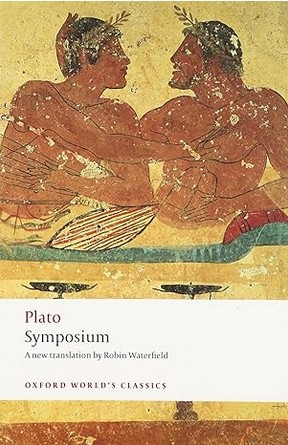
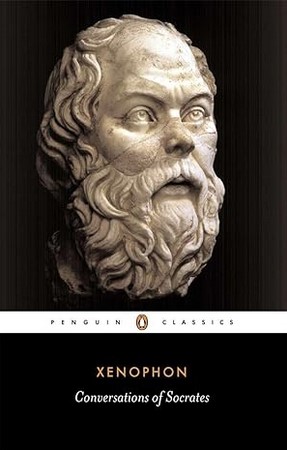
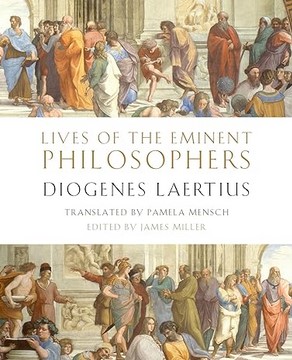
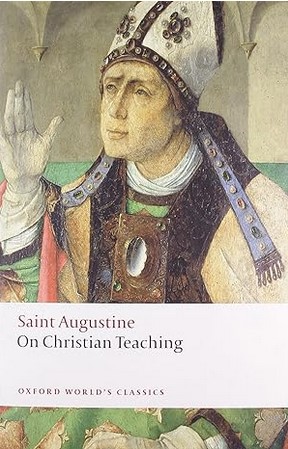


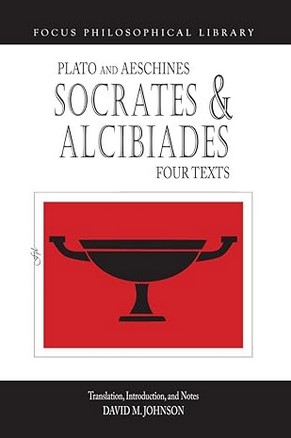
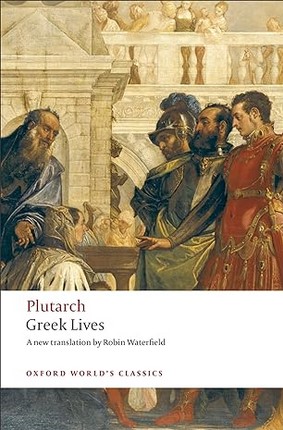
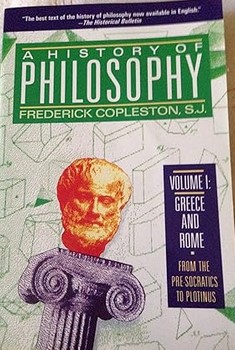
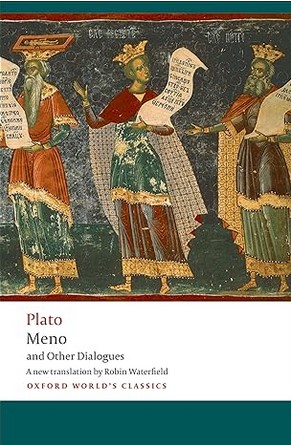
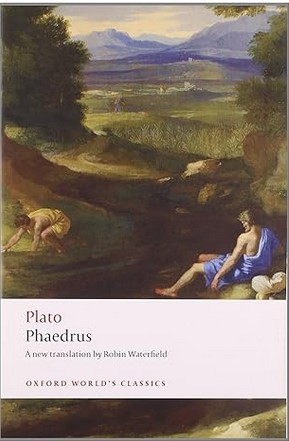

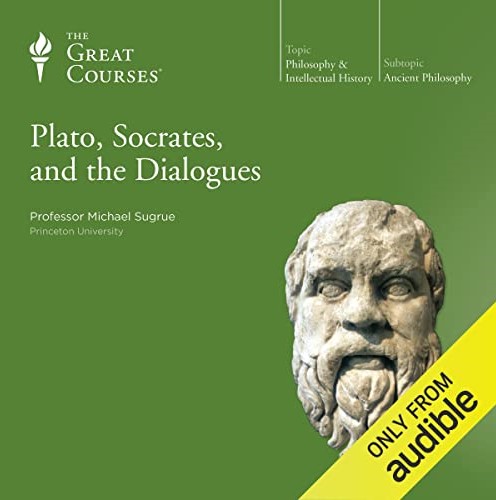
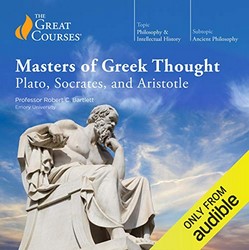
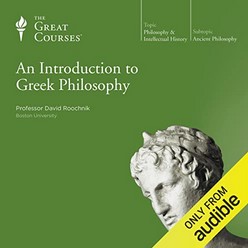
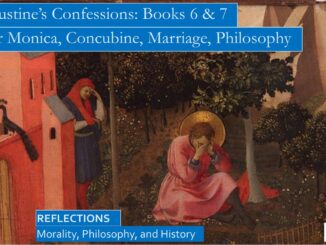
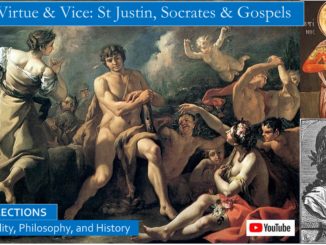
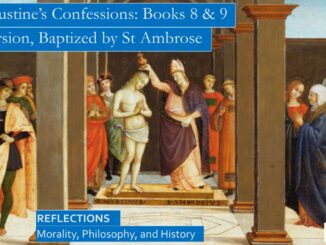
4 Trackbacks / Pingbacks